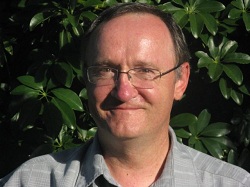Dr. Martin Muschol
University of South Florida

What Can Soft Condensed Matter Physics Tell Us about Alzheimer's Disease?
102 Cardwell Hall
March 30, 2015
4:30 p.m.
Accumulation of insoluble protein fibrils is a critical indicator of multiple human disorders, including Alzheimer's disease, Parkinson's disease and type-II diabetes. Understanding the molecular mechanisms regulating and promoting the formation of amyloid protein fibrils in vitro and in vivo represents a critical step towards devising effective treatment strategies. Amyloid fibril formation also challenges our understanding of aggregation, self-assembly and phase separation in polymeric systems.
We have studied molecular aspects of amyloid self-assembly using hen egg-white lysozyme to study amyloid assembly in vitro. Under these conditions lysozyme can form at least three distinct aggregate with distinct morphologies and internal organization. We were interested to find out what properties of lysozyme, and of its solution environment, might regulate the assembly pathways lysozyme will follow, what growth kinetics they display, and how these different aggregate "phases" are related to one other. Combining in-situ dynamic light scattering (DLS) with atomic force microscopy (AFM), fluorescence spectroscopy, circular dichroism and infrared spectroscopy we investigated the growth kinetics, morphology and structure of lysozyme amyloid. Based on our experimental data and with support from theoretical modeling by Dr. Schmit (KSU) we report here on the unusual role that charge repulsion plays in regulating amyloid assembly pathways and aggregate stabilities. These insights have some intriguing implications for our understanding of amyloid formation in human disease.
